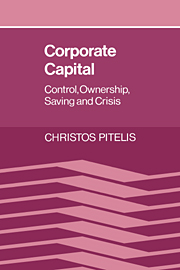3 - Shareownership and ‘social’ choice
Published online by Cambridge University Press: 21 September 2009
Summary
At the microeconomic or individual level the tendency towards the socialization, of the ownership of the means of production (SOMP) and its associated possibility that not all shareholders are in control of firms raises the important question as to whether corporate policies represent a consensus outcome of all shareholders' preferences, or rather an imposition of the preferences of some controlling shareholders and/or managers on the rest, the non-controlling shareholders. Particularly important is the decision as to what proportion of profits to pay out as dividends to the shareholders, the pay-out ratio, which simultaneously determines the part of profit retained within the corporation, the retention ratio. The importance of this decision arises from the possibility that changes in the retention ratio may lead to changes in the proportion of private (personal plus corporate) income saved for the purpose of capital accumulation. In addition, given that, unless such changes are in line with the preferences of all shareholders, the location of control within the giant corporation may be directly linked with financial capital accumulation, through constraining the choices of the non-controlling shareholders as to what proportion of their private disposable income they will consume/save. This latter possibility has become the subject of debate between three different schools of thought in economics; the neoclassicals, the managerialists and the Marxists.
In the neoclassical tradition the possibility that corporate decisions on retentions may not reflect the preferences of all shareholders does not arise.
- Type
- Chapter
- Information
- Corporate CapitalControl, Ownership, Saving and Crisis, pp. 28 - 50Publisher: Cambridge University PressPrint publication year: 1987

